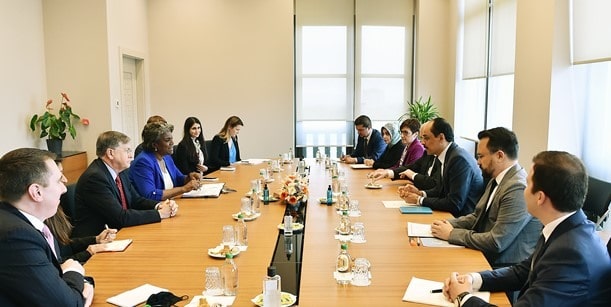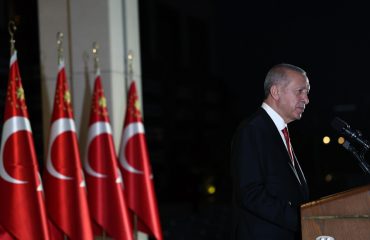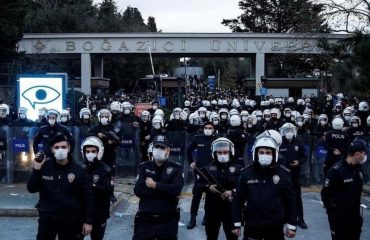

The current state of Turkish-American relations reminds me of William Shakespeare’s “To be or not to be, that is the question” tirade expressed by Hamlet in the third act of the play.
I think this tirade perfectly applies to the difficulty of managing the bilateral confrontation we will witness later this month. While both parties have a lot to gain from exiting the current impasse, the cost of failed negotiations will undoubtedly be higher for Turkey.
Last week, the United States dispatched its highest-ranking foreign service officer after Secretary Antony Blinken to Turkey. During her interactions, Deputy Secretary of State Wendy Sherman explained the viewpoints of the Biden administration to help pave the way for the Erdoğan-Biden bilateral meeting expected to take place on June 14.
She emphasized that the most important obstacle to bilateral relations is Turkey’s procurement of the Russian S-400 missile defense system stating that it causes problems for the NATO Alliance. She also underlined concerns about the state of human rights, democracy, individual freedoms and the rule of law in Turkey. Sherman pointed out that these concerns also affect mutual trade and bilateral economic relations stressing the importance of rule of law and predictability for the business communities. Finally, she also expressed her disappointment with Turkey’s withdrawal from the Istanbul Convention. As Ms. Sherman made a point of addressing the public opinion directly, we have a general understanding of what the American position will be during the upcoming meeting in Brussels.
“New era” remarks
On a positive note, there are signs that the government of Turkey seems inclined to appease its American counterparts. While pro-government media outlets made an effort to create an impression that Ms. Sherman was treated as an ordinary visitor, the whisper network gave away that a very different attitude was adopted behind closed doors. While we are not privy to any concrete information to help explain the thinking of President Erdoğan, his remarks about “a new era” in Turkish-American relations following a meeting with American business executives are noteworthy. These comments contradict his previous statements addressing Mr. Biden with the following words: “You are writing history with your bloody hands. You forced us to say this. We cannot step back.” And his last TRT interview on official state television make it clear that Erdoğan still prefers Turkish relations with the United States to be conducted on a personal level rather than rebuilding and strengthening institutional ties; something he succeeded in during the Trump era.
During his visit to Athens, Greece, Foreign Minister Mevlüt Çavuşoğlu told the press that “the U.S. has a desire to work closely with Turkey”. While Çavuşoğlu takes care to attribute Turkey’s desire to the United States to manage his own political base in Turkey, this statement should be interpreted as an expression of Turkey’s desire to repair relations with the United States.
Sadly, Deputy Secretary Sherman’s visit coincided with outrageous allegations of an organized crime leader that cast doubt on Turkey’s political stability and democratic development. While this scandal was trending on social media, Turkey voted against NATO holding Belarus accountable for its recent act of state terrorism. Under different circumstances, the visit of Wendy Sherman could have served as an excellent opportunity to better prepare for the upcoming bilateral meeting. Instead, the Turkish government chose to act as if it is negotiating with itself in what really looks like a dialogue of the deaf. This week, we have another important visitor. The Permanent Representative of the U.S. to the U.N., Linda Thomas-Greenfield, will hold talks in Turkey focusing on the continued Syrian crisis and the refugees. Keep in mind that the Permanent Representative of the U.S. to the U.N. is considered a cabinet member and helps determine American foreign policy. Consequently, I hope that Greenfield’s visit will be better managed and help prepare concrete confidence-building steps both sides agree to take.
The alternative is a break in relations that could have historic repercussions. Both governments need to realize that it will not be possible to prevent such a major crisis by only prioritizing our own truths. On our side, we need to realize the dynamics of contemporary U.S. Politics. President Biden doesn’t have absolute dominance within the Democratic Party and depends on the support of a coalition within his own ranks. In many respects, he has to appease opposing groups within that coalition. Furthermore, the balance in favor of the Democrats in Congress is very thin and it is not going to be easy to implement his domestic agenda.
Turkey’s loss of confidence
Meanwhile, the Biden Administration also seeks to reconstruct the international balance of power. The U.S. wants to break the China-Russia axis and prevent these countries from gaining weight in world politics. More generally, he has committed publicly to align bilateral relations to upholding democratic values and fundamental rights.
Meanwhile, Turkey has lost a lot of confidence among its traditional friends and allies. We are experiencing a marked stagnation in our relations with the E.U. and relations with Greece and France are especially strained. We still don’t have acting ambassadors in Israel and Egypt and our efforts to normalize relations with these two countries have so far failed. To make matters worse, Russia has issued two harsh warnings expressing its displeasure about our UAV sales to Ukraine and regarding our statement about Russian policies in Crimea.
This is the environment in which the first Biden-Erdoğan meeting will take place. Under such circumstances, it seems unrealistic to expect a positive outcome but experienced analysts still carry hope that the two experienced leaders will surprise everyone and find common ground despite the many disagreements. But the only way that a meaningful difference in the status quo can come out of the meeting is for Turkey to back down with regard to the procurement of the S-400. Indeed, Wendy Sherman has made it very clear that this is non-negotiable. Alternatively, the meeting, at best, will not result in much more than a photo opportunity with the two leaders smiling for the cameras.
We have two weeks to go. Without wasting time, we must intensify preparatory consultations and start building allies who empathize with our negotiating positions. Subsequently, we need to enter the meeting armed with creative and constructive ideas. What is at stake for Turkey reminds me of Hamlet’s tirade “To be or not to be”; it might well be our last opportunity.


